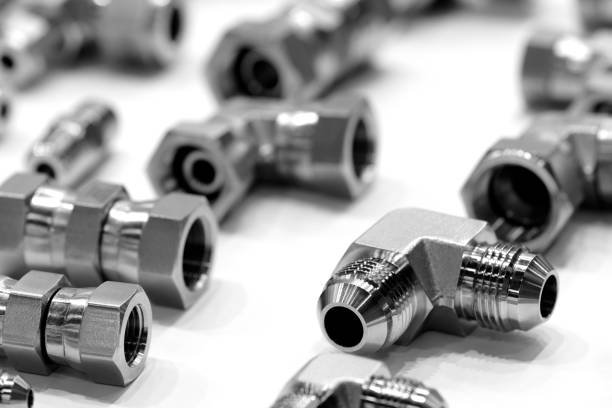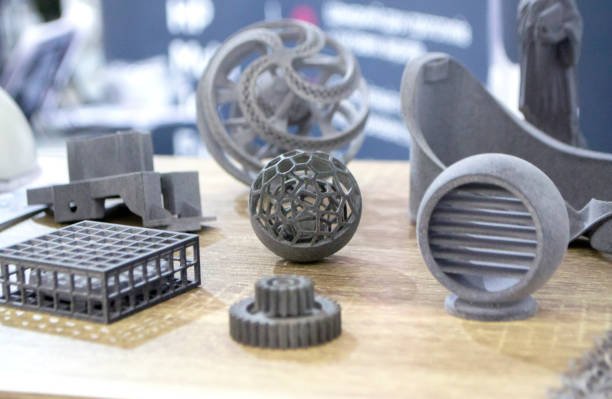Sheet Metal Fabrication Service
Custom sheet metal parts and prototypes with exceptional precision and quality. Expertly crafted sheet metal components for diverse industries and applications. Delivering high-quality, customized sheet metal parts to meet your exact specifications.
All uploads are secure and confidential.
- 20+ sets of machines
- 10+ materials
- Diverse surface finishing
Our Sheet Metal Fabrication Technologies
Our sheet metal fabrication services provide high-precision, custom metal parts and prototypes tailored to your exact specifications. Utilizing advanced cutting, bending, welding, and finishing techniques, we deliver durable and high-quality components for various industries, including automotive, aerospace, electronics, and industrial applications. With a focus on precision and quality assurance, we ensure every project meets the highest standards.

Laser Cutting
Our laser cutting services offer precise and clean cuts for various metals, perfect for intricate shapes and detailed designs.

Bending
Our bending services provide accurate and consistent metal forming, ensuring your parts meet exact specifications with high-quality finishes.
Sheet Metal Materials We Have
Aluminum Alloys

Aluminum 6061
Features: Versatile, good mechanical properties, excellent corrosion resistance, weldable, and suitable for various applications.
Applications: Aerospace, automotive, marine, and general fabrication.
Aluminum 5052
Features: High fatigue strength, excellent corrosion resistance, good workability, and weldability.
Applications: Marine environments, fuel tanks, pressure vessels, and sheet metal work.
Aluminum 1100
Features: Excellent corrosion resistance, good formability, and high thermal and electrical conductivity.
Applications: Heat exchangers, chemical equipment, and food packaging.
Steel Alloys

Steel C20 (1020)
Features: Good machinability, weldability, and cost-effectiveness. Lower tensile strength but easily formable.
Applications: Structural components, fasteners, automotive parts, and general fabrication.
Steel C45 (1045)
Features: Medium carbon steel with good tensile strength and impact resistance. Easily machinable and can be heat treated.
Applications: Gears, bolts, axles, machine parts, and shafts.
Steel S235
Features: Low carbon structural steel with good weldability and machinability. Provides moderate strength and toughness.
Applications: Structural components, construction materials, frames, and brackets.
Steel S355
Features: High-strength low-alloy structural steel with excellent weldability, toughness, and machinability. Offers higher strength than S235.
Applications: Structural engineering, bridges, cranes, and heavy-load bearing components.
Galvanized Steel
Features: Coated with a layer of zinc for enhanced corrosion resistance.
Applications: Outdoor applications, HVAC ductwork, and construction.
Stainless Steel Alloys

Stainless Steel 304
Features: Excellent corrosion resistance, good formability, and weldability. Non-magnetic.
Applications: Kitchen equipment, food processing equipment, chemical containers, and architectural applications.
Stainless Steel 316
Features: Superior corrosion resistance, particularly against chlorides and marine environments. Good mechanical properties.
Applications: Marine equipment, medical devices, chemical processing equipment, and outdoor architectural elements.
Stainless Steel 301
Features: High strength, good ductility, and excellent corrosion resistance. Can be cold worked to increase strength.
Applications: Springs, fasteners, aircraft parts, and automotive components.
Copper Alloys

Copper Alloy C110 (Electrolytic Tough Pitch, ETP)
Features: High electrical and thermal conductivity, good corrosion resistance, excellent formability, and solderability.
Applications: Electrical conductors, wiring, bus bars, and heat exchangers.
Copper Alloy C101 (Oxygen-Free Copper, OFC)
Features: Excellent electrical and thermal conductivity, high purity, improved ductility, and weldability compared to C110.
Applications: High-quality audio cables, vacuum devices, electronic components, and superconductors.
Copper Alloy C220 (Commercial Bronze)
Features: Good strength, corrosion resistance, and formability. Contains around 90% copper and 10% zinc.
Applications: Decorative items, architectural components, springs, and bearings.
Copper Alloy C260 (Cartridge Brass)
Features: Good strength, excellent formability, good corrosion resistance, and moderate conductivity. Contains around 70% copper and 30% zinc.
Applications: Ammunition casings, automotive radiators, heat exchangers, and musical instruments.
Sheet Metal Fabrication Surface Finishes
Surface finishes are critical in CNC machining as they affect the appearance, functionality, and performance of the final product. Here are some common surface finishes used in CNC machining.
These surface finishes offer a range of options depending on the requirements for appearance, corrosion resistance, wear resistance, and other functional properties.

Standard
- Description: The surface finish directly from the machine without any additional processing. Tool marks are visible.
- Ra Value: 3.2 µm (125 µin)
- Applications: Internal components, parts not requiring aesthetic appeal, and prototypes.

Bead Blasting
- Description: A surface finishing process where small glass beads or other abrasive materials are blasted onto the part’s surface to create a smooth, matte finish.
- Ra Value: 1.6-3.2 µm (63-125 µin)
- Applications: Aesthetic parts, removal of tool marks, and preparation for painting or coating.

Anodizing
- Description: An electrochemical process that converts the metal surface into an anodic oxide finish. Commonly used for aluminum parts, it can be clear or colored.
- Ra Value: Varies (usually between 0.8-1.6 µm or 32-63 µin)
- Applications: Aerospace, automotive, consumer electronics, and decorative parts.

Powder Coating
- Description: A dry finishing process that involves the application of a powdered paint onto the part’s surface, which is then cured under heat to form a solid, durable finish.
- Ra Value: Varies (depends on powder type and application method)
- Applications: Consumer products, automotive components, and industrial equipment.

Electropolishing
- Description: An electrochemical process that removes a thin layer of material from the part’s surface, resulting in a smooth, shiny finish. It also improves corrosion resistance.
- Ra Value: 0.4-1.6 µm (16-63 µin)
- Applications: Medical devices, food processing equipment, and semiconductor components.

Brushing
- Description: A surface finishing process where abrasive brushes are used to create a uniform, directional satin finish.
- Ra Value: 0.8-1.6 µm (32-63 µin)
- Applications: Decorative parts, consumer electronics, and architectural components.

Polishing
- Description: A mechanical process that involves rubbing the part’s surface with an abrasive material to create a high-gloss, mirror-like finish.
- Ra Value: 0.025-0.2 µm (1-8 µin)
- Applications: Decorative parts, optical components, and high-precision equipment.

Plating
- Description: A process where a thin layer of metal (such as nickel, chrome, or gold) is deposited onto the part’s surface to improve appearance, corrosion resistance, and wear resistance.
- Ra Value: Varies (depends on plating material and process)
- Applications: Electronics, automotive components, and decorative parts.

Passivation
- Description: A chemical treatment used on stainless steel parts to remove free iron and enhance corrosion resistance by creating a passive oxide layer.
- Ra Value: No significant change
- Applications: Medical devices, food processing equipment, and marine components.

Painting
- Description: The application of paint or lacquer to the part’s surface for aesthetic purposes and protection against corrosion and wear.
- Ra Value: Varies (depends on paint type and application method)
- Applications: Consumer products, automotive components, and industrial equipment.
ProtoTi Sheet Metal Fabrication General Specifications
Material Types
- Metals: Aluminum, steel, stainless steel, copper, brass.
- Thickness Range: Typically from 0.5mm to 6mm (0.02″ to 0.24″), though capabilities can vary.
Cutting Techniques
- Laser Cutting: High precision, suitable for complex shapes and fine details.
- Plasma Cutting: Fast, effective for thicker materials.
- Water Jet Cutting: Suitable for a variety of materials without heat distortion.
- Shearing: Quick and efficient for straight cuts.
Forming Techniques
- Bending: Achieved using press brakes, with capabilities up to 12 feet in length.
- Rolling: For creating cylindrical shapes or bends.
- Stamping: High-speed production of complex shapes.
- Punching: Creating holes or cutouts in sheet metal.
Joining Techniques
- Welding: MIG, TIG, and spot welding for strong, permanent joins.
- Riveting: Mechanical fastening for dissimilar materials.
- Adhesive Bonding: Suitable for materials sensitive to heat.
ProtoTi Sheet Metal Fabrication Tolerances
Cutting Tolerances
- Laser Cutting: ±0.1mm (±0.004″).
- Plasma Cutting: ±0.5mm (±0.020″).
- Water Jet Cutting: ±0.2mm (±0.008″).
- Shearing: ±0.3mm (±0.012″).
Bending Tolerances
- General Bending: ±0.5mm (±0.020″), depending on material thickness and bend length.
- Critical Bends: ±0.1mm (±0.004″) achievable with precise setup and tooling.
Forming Tolerances
- Rolling: ±0.5mm (±0.020″) for radius consistency.
- Stamping: ±0.1mm (±0.004″) for high precision parts.
- Punching: ±0.1mm (±0.004″) for hole size and position.
Flatness Tolerances
- Post-Cutting: ±0.5mm (±0.020″) per meter of length.
- Post-Bending: ±0.2mm (±0.008″) per 100mm of bend length.
Welding Tolerances
- General Welds: ±1mm (±0.040″) for overall dimensions.
- Precision Welds: ±0.5mm (±0.020″) achievable with jigs and fixtures.
Hole and Slot Tolerances
- General Holes: ±0.1mm (±0.004″) for diameter and position.
- Precision Holes: ±0.05mm (±0.002″) with reaming or secondary machining.
Edge Tolerances
- General Edges: ±0.2mm (±0.008″) for cut edges.
- Precision Edges: ±0.1mm (±0.004″) achievable with secondary finishing.
Instant Quote
Step 1:
Upload File
Formats supported: STL, STP, STEP, OBJ, IGS, IGES, and more..
Step 2:
Get Quote
Choose material and finishing.
Step 3:
Confirm Order
Instant pricing and lead time.
Step 4:
Production & Delivery
Parts shipped to your door.
Ready to Try?
Why ProtoTi

In House Production Capacity
Our in-house production ensures superior quality control and faster turnaround times, eliminating delays. We offer flexible, customized solutions and competitive pricing by reducing outsourcing costs. Seamless team communication ensures smooth workflow and rapid issue resolution. Enhanced security protects your sensitive information, while minimizing supply chain risks ensures reliable production. Continuous innovation with the latest technologies consistently improves efficiency and quality.
Extensive Supplier Network
Leverage our extensive supplier network to access a wide range of high-quality materials and services. We ensure fast, reliable sourcing and competitive pricing, enabling you to meet your manufacturing needs efficiently and cost-effectively. Benefit from our strong partnerships and streamlined supply chain management for superior project outcomes.


Professional Engineering Support
Our professional engineering support offers expert guidance at every stage of your project. From initial design to final production, our experienced engineers ensure optimal performance, precision, and efficiency. Leverage our technical expertise and innovative solutions to overcome challenges and achieve your manufacturing goals with confidence and excellence.
Quality Assurance
Our quality assurance guarantees the highest standards in every product we deliver. Through rigorous testing and meticulous attention to detail, we ensure consistency, reliability, and excellence. Trust our commitment to quality to meet and exceed your expectations on every project.

Sheet Metal Fabrication FAQs
1. What materials are commonly used in sheet metal fabrication?
We commonly use aluminum, steel, stainless steel, copper, and brass for various fabrication projects.
2. What is the typical turnaround time for sheet metal fabrication projects?
Turnaround time varies based on project complexity, but standard projects are typically completed within 2-4 weeks.
3. What are the maximum dimensions and thicknesses you can work with?
We can handle materials up to 12 feet in length and thicknesses ranging from 0.5mm to 6mm (0.02" to 0.24").
4. What surface finishes do you offer?
We offer various finishes, including bead blasting, powder coating, anodizing, brushing, and more.
5. How do you ensure the quality of the fabricated parts?
Quality is ensured through rigorous inspection processes, adherence to tight tolerances, and using high-quality materials.
6. Can you provide custom prototypes for my project?
Yes, we specialize in creating custom prototypes to help you visualize and test your designs.
7. What cutting techniques do you use?
We utilize laser cutting, plasma cutting, water jet cutting, and shearing for precise and efficient cutting.
8. Do you offer design assistance for fabrication projects?
Yes, our experienced engineers can provide design assistance to optimize your parts for manufacturability.
9. What are the typical tolerances you can achieve?
We can achieve tolerances as tight as ±0.1mm (±0.004") for cutting and ±0.5mm (±0.020") for bending, depending on the project requirements.
10. What types of welding processes do you use?
We offer MIG, TIG, and spot welding to suit various material types and project needs.
11. Can you handle high-volume production runs?
Can you handle high-volume production runs?
12. Do you provide any post-fabrication services?
Yes, we offer additional services such as assembly, packaging, and shipping to meet your project needs.
Other Manufacturing Capabilities from ProtoTi

3D Printing
- SLA, SLS, SLM, MJF, DLMS, DLP, FDM.
- 30+ materials: Resin, Nylon, Metal.
- Tolerance ±0.3mm or ±0.3%.
- Lead time from 1 business day.

CNC Machining
- Turning, Milling, Surface Finishes, Rapid Prototyping.
- 50+ materials: Aluminum, Stainless Steel, Carbon Steel, Brass, Copper, Plastic, and more.
- Tolerance down to ±0.02mm.
- Lead time from 5 business day.

Vacuum Casting
- Silicon Mold Making, Low Volume Prototyping.
- 5+ materials: PC, ABS, PP, PMMA, Rubber, TPU.
- Tolerance down to ±0.1mm.




